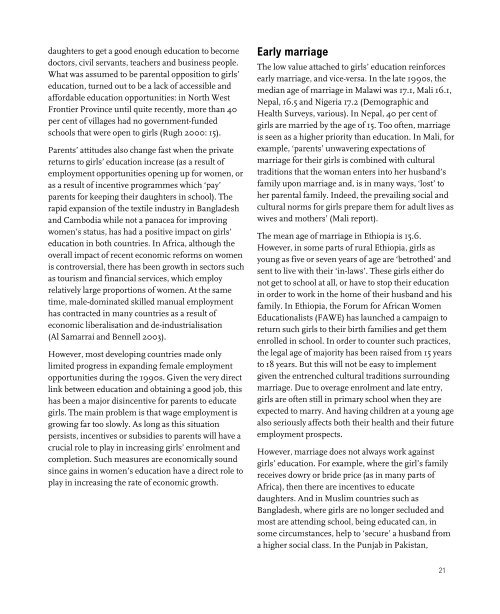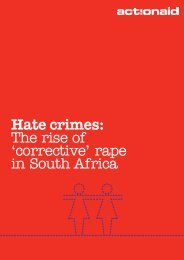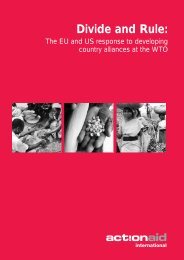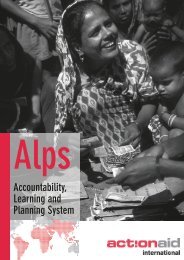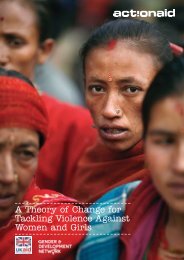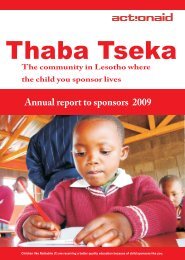A fair chance - United Nations Girls' Education Initiative
A fair chance - United Nations Girls' Education Initiative
A fair chance - United Nations Girls' Education Initiative
You also want an ePaper? Increase the reach of your titles
YUMPU automatically turns print PDFs into web optimized ePapers that Google loves.
daughters to get a good enough education to becomedoctors, civil servants, teachers and business people.What was assumed to be parental opposition to girls’education, turned out to be a lack of accessible andaffordable education opportunities: in North WestFrontier Province until quite recently, more than 40per cent of villages had no government-fundedschools that were open to girls (Rugh 2000: 15).Parents’ attitudes also change fast when the privatereturns to girls’ education increase (as a result ofemployment opportunities opening up for women, oras a result of incentive programmes which ‘pay’parents for keeping their daughters in school). Therapid expansion of the textile industry in Bangladeshand Cambodia while not a panacea for improvingwomen’s status, has had a positive impact on girls’education in both countries. In Africa, although theoverall impact of recent economic reforms on womenis controversial, there has been growth in sectors suchas tourism and financial services, which employrelatively large proportions of women. At the sametime, male-dominated skilled manual employmenthas contracted in many countries as a result ofeconomic liberalisation and de-industrialisation(Al Samarrai and Bennell 2003).However, most developing countries made onlylimited progress in expanding female employmentopportunities during the 1990s. Given the very directlink between education and obtaining a good job, thishas been a major disincentive for parents to educategirls. The main problem is that wage employment isgrowing far too slowly. As long as this situationpersists, incentives or subsidies to parents will have acrucial role to play in increasing girls’ enrolment andcompletion. Such measures are economically soundsince gains in women’s education have a direct role toplay in increasing the rate of economic growth.Early marriageThe low value attached to girls’ education reinforcesearly marriage, and vice-versa. In the late 1990s, themedian age of marriage in Malawi was 17.1, Mali 16.1,Nepal, 16.5 and Nigeria 17.2 (Demographic andHealth Surveys, various). In Nepal, 40 per cent ofgirls are married by the age of 15. Too often, marriageis seen as a higher priority than education. In Mali, forexample, ‘parents’ unwavering expectations ofmarriage for their girls is combined with culturaltraditions that the woman enters into her husband’sfamily upon marriage and, is in many ways, ‘lost’ toher parental family. Indeed, the prevailing social andcultural norms for girls prepare them for adult lives aswives and mothers’ (Mali report).The mean age of marriage in Ethiopia is 15.6.However, in some parts of rural Ethiopia, girls asyoung as five or seven years of age are ‘betrothed’ andsent to live with their ‘in-laws’. These girls either donot get to school at all, or have to stop their educationin order to work in the home of their husband and hisfamily. In Ethiopia, the Forum for African Women<strong>Education</strong>alists (FAWE) has launched a campaign toreturn such girls to their birth families and get themenrolled in school. In order to counter such practices,the legal age of majority has been raised from 15 yearsto 18 years. But this will not be easy to implementgiven the entrenched cultural traditions surroundingmarriage. Due to overage enrolment and late entry,girls are often still in primary school when they areexpected to marry. And having children at a young agealso seriously affects both their health and their futureemployment prospects.However, marriage does not always work againstgirls’ education. For example, where the girl’s familyreceives dowry or bride price (as in many parts ofAfrica), then there are incentives to educatedaughters. And in Muslim countries such asBangladesh, where girls are no longer secluded andmost are attending school, being educated can, insome circumstances, help to ‘secure’ a husband froma higher social class. In the Punjab in Pakistan,21


